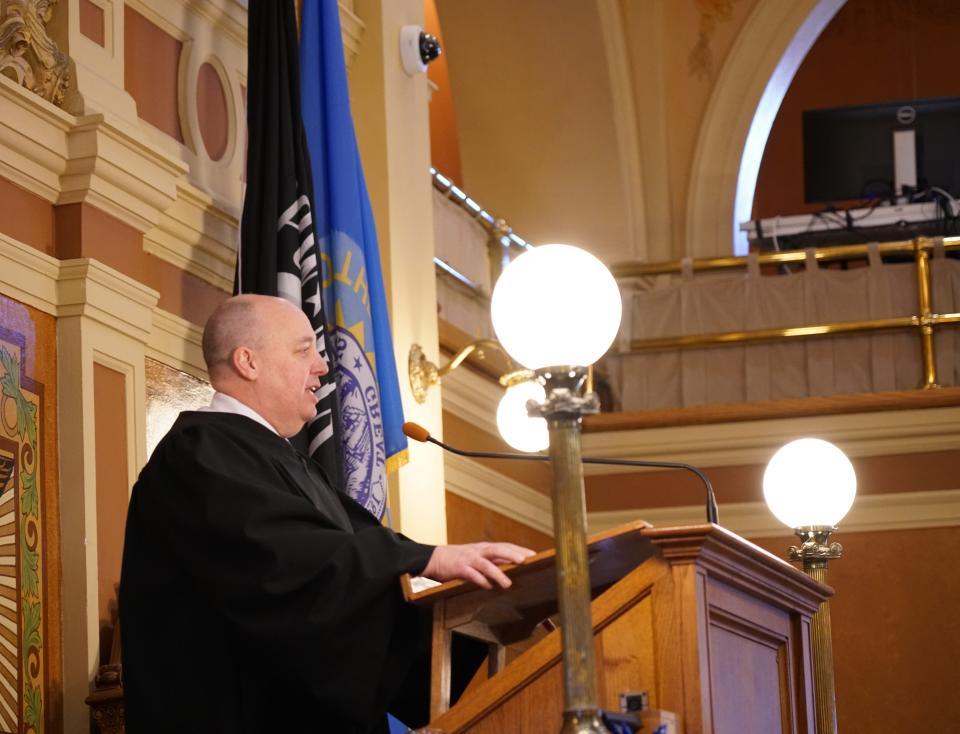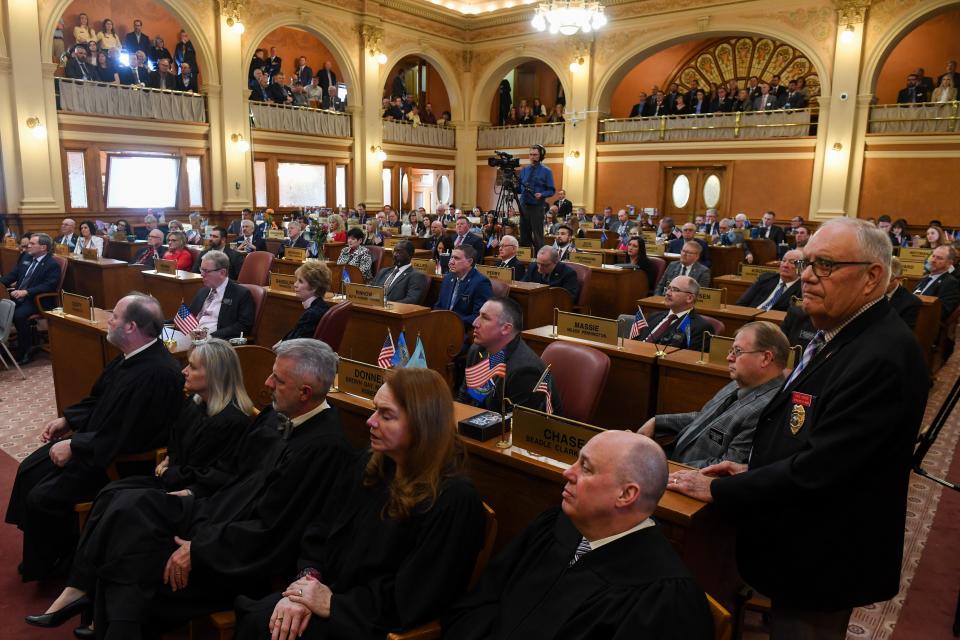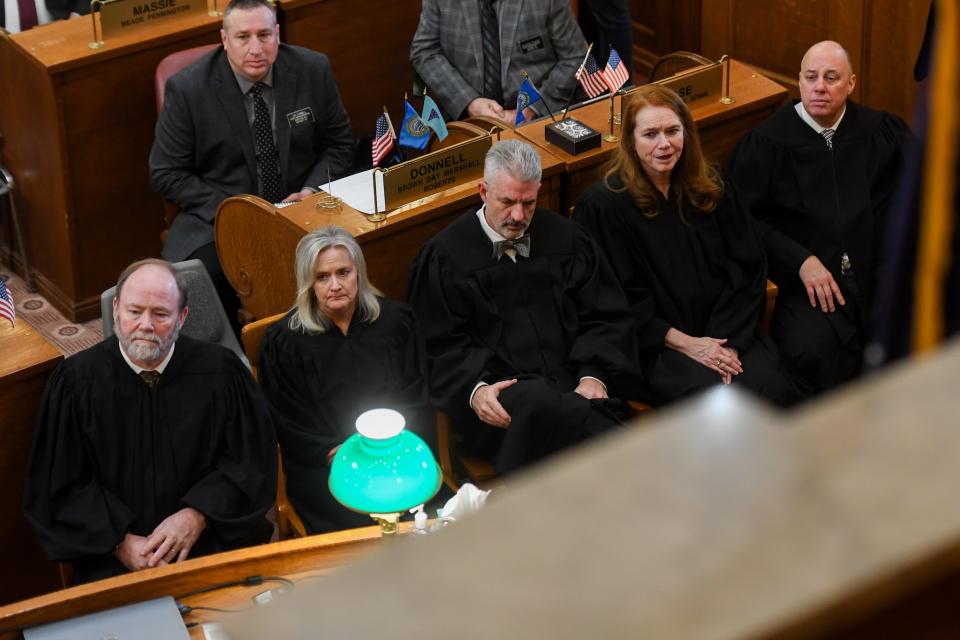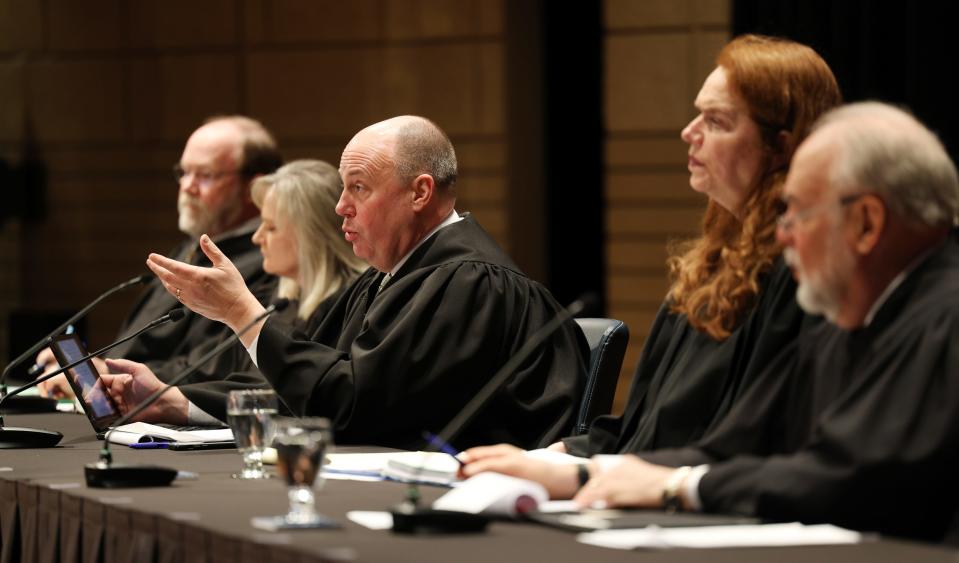State of the Judiciary 'plants seeds' for the future of South Dakota courts
- Oops!Something went wrong.Please try again later.
PIERRE — Chief Justice Steven Jensen paid homage to the past work done by South Dakota’s court system to illustrate what work must continue within the judiciary branch to address problems society faces today.

“I believe the court system has a good and important story to tell,” he told the joint gathering of the House and the Senate on Wednesday morning as part of his State of the Judiciary address to begin the 99th Legislative session.
Jensen pointed to the work done more than a decade ago to create an electronic court filing system invaluable today for attorneys, judges and the public. In this vein, his speech noted the work done today in problem solving courts to the bolstering of indigent defense that will bring forth a better future for the state, the judiciary, counties and people affected by the courts every day.
Indigent defense work continues
Two years of work to reimagine what indigent defense can look like has continued, Jensen said, explaining a summer task force recommended the creation of a new office on the state level for public defenders and the creation of an indigent defense commission.

The proposed public defender's office, overseen by the commission, will focus on criminal case appeals as well as expanding felony trial work. The office will also offer extra training for attorneys who are providing court appointed defense services.
Jensen requested the Legislature set aside $1.4 million to seed the office and commission, along with seven employees.
More: South Dakota task force recommends 3 ideas for statewide indigent legal services
The new office will help alleviate the financial burden South Dakota’s counties face annual as they continue to fund these services for those who can’t afford legal counsel.
He said this initial expenditure by the state is estimated to reduce the financial burden on counties by $2.1 million and actually save approximately $600,000 in overall indigent defense costs across the state.
“This first step is a big one," Jensen said. "But the next step of the process will bring about the most broad improvements to a system that lacks much needed oversight."
Problem solving courts support long lasting change
South Dakota’s problem solving courts received due recognition in Jensen’s speech, as well as in Gov. Kristi Noem’s State of the State speech.

While Noem recognized Leta Wise Spirit on Tuesday, who had been credited with volunteer work and mentoring at her graduation of the Sixth Circuit Court problem solving court, Jensen told the stories of another three individuals who had successfully completed their courses.
More: Noem's Top 10 list for State of the State lists accomplishments but remains light on policy
The courts help people access drug and alcohol abuse treatment as well as set them up for success in the future in the workforce.
“These courts have the immediate impact of reducing costs and incarceration and increasing the likelihood of rehabilitation,” Jensen said, noting that of the 2,500 people served in the 17 problem solving courts, there has been a 60% success rate. “But their broader impact lies in the profound transformation of individuals and the positive influence on their families, employers, communities, and even the burden on taxpayers.”
As the problem courts and other specialties continue to be successful, Jensen asked lawmakers to add an additional circuit court judge and deputy clerk in the Second Circuit Court, home to Minnehaha and Lincoln County.

Both counties have seen their population increase significantly and as a result court cases have increased.
“Second Circuit judges have also seen demands on their time [and] on cases that they hear,”he said.
‘Growth and Redemption’ for young adults
The work done by a task force, looking into barriers young adults between 18 and 25 face when they become involved with the criminal justice system, has provided new pilot programs across the state, Jensen said.
In Mitchell, young adults will be able to access life skills classes and mentoring. Pennington County also offers a diversion program that serves as “a model for other counties,” Jensen said.
By providing diversion programs, creating opportunities for housing, education and employment, and finding support networks, Jensen said it shows not all hope is lost for young people when they make a serious mistake in life.
“I believe there are some tremendous opportunities to continue to improve our efforts at rehabilitating young adult offenders,” he said, “And doing so we contribute to a society that values the potential for growth and redemption for individuals who truly wish to change.”
This article originally appeared on Sioux Falls Argus Leader: Chief Justice of South Dakota Supreme Court addresses lawmakers

